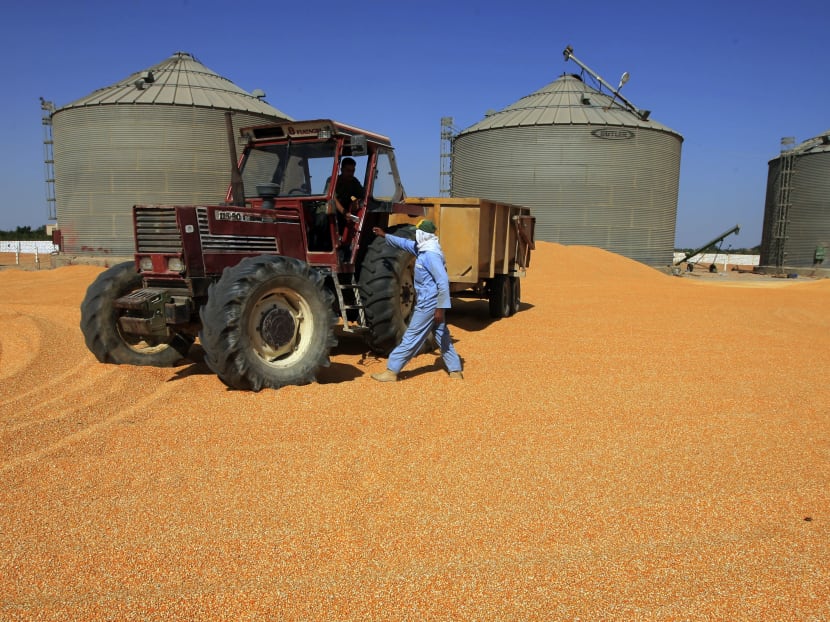Pigeons grow fat in Egypt as poor storage means wasted wheat
LONDON — You can tell an Egyptian grain store by the birds circling overhead.

Egyptian workers gather the crop at a field off the desert road, 80 kms west of Cairo. AFP file photo
LONDON — You can tell an Egyptian grain store by the birds circling overhead.
As much as half of the wheat the state buys from its farmers is lost each year to pigeons, rodents and thieves scavenging national stockpiles that are often just stacked in rough jute bags open to the elements, said Mr David Blumberg, whose US company is working with the government to modernise and build the Middle East’s largest grain-storage network.
“If you ever passed by a landfill and saw all the birds circling above, that’s kind of the situation,” said Mr Blumberg, chief executive officer of Blumberg Grain, Middle East & Africa, referring to the facilities he’s working on replacing. “There is no protective covering.”
Wasted grain is a big problem for Egypt, where rising food prices intensified unrest that led to the overthrow of the government during Arab Spring protests in 2011.The country is the world’s biggest wheat importer and spends billions of dollars on grain each year for a subsidised bread programme to ensure its people can afford food.
The government buys about 40 per cent of the country’s wheat production each year, but waste isn’t limited to the domestic crop. Poor infrastructure, port backlogs and ageing storage sites mean a third of imported supply is also lost, said Mr Gilles Mettetal, director of agri-business at the European Bank for Reconstruction and Development.
GOVERNMENT SPENDING
Any improvements that may cut imports may have consequences for the global wheat market, which is contending with the largest stockpiles in almost three decades. Bumper harvests around the world have pushed benchmark prices in Chicago to near the lowest since 2010. Futures traded at US$4.8025 (S$6.78) a bushel today (Dec 8), 20 per cent lower than the same time last year.
The Egyptian government will spend US$1.3 billion this year buying wheat from local farmers, according to the United Nations’ Food & Agriculture Organization. Since June, it paid more than US$560 million to import wheat, mostly from the Black Sea region and France, Bloomberg calculations show.
The Blumberg project will initially see 93 steel sheds, each able to hold 8,000 metric tonnes of grain, ready within five months.The country eventually wants to build almost 300 warehouses storing 2.35 million tonnes of locally grown grain, Mr Blumberg said in an interview in Geneva last month. The sites will clean, weigh, bag and monitor grain from warehouse to flour miller. If anything goes missing, the operators will know.
SUBSIDY PROGRAMME
Egypt is taking other steps to boost the efficiency of its subsidised food programmes, which in the past made bread so cheap that some people fed it to livestock. The country started a smart-card system last year that pays bakeries for each loaf they sell instead of providing them directly with subsidised flour, which was often resold on the black market.
The government is also planning a US$1.7 billion silo project at the Port of Damietta for imported wheat with storage capacity of 7.5 million tonnes. While improving the situation, the government should make it easier for private firms to develop and own their own facilities, the EBRD’s Mettetal said.
Medsofts is a private trader doing just that, following a US$20 million loan from the EBRD to operate silos along the Nile River. The company transports grain by barge to bypass inefficient unloading operations at the Port of Alexandria, Mr Mettetal said. The EBRD wants to fund other such projects.
PRIVATE INVESTMENT
“We have been approached by large grain-trading companies, among the top ones, and all are keen to invest in building their own facilities,” Mr Mettetal said Nov 25. Anything that reduces wastage could curb Egyptian imports or more easily allow it to meet rising demand for feed grains in the long term, he said.
Egyptian wheat imports have risen about 5 per cent on average each year over the past decade, compared with a 3 per cent annual increase in consumption, USDA data show. Imports surged in 2009 following the spike in food prices the previous year. Waste isn’t a problem only in Egypt — the UN’s FAO estimates that a third of all food globally is lost before it reaches consumers’ dinner tables.
At least 10 Arab nations sought to expand storage capacity following food-price spikes in 2008,the World Bank estimated in 2012, and some of those plans are now coming to fruition. Saudi Arabia, the largest barley importer, will increase public storage capacity by a quarter by year-end, according to the US Department of Agriculture’s Foreign Agricultural Service. Some private companies have announced expansion projects in the region as well.
CONFLICT ISSUES
Political unrest and war have derailed some plans, said Mr Abdolreza Abbassian, a senior economist at the UN’s FAO in Rome. Syria used to have one the biggest storage capacities relative to demand in the Middle East. By January, the government had lost control of more than half its large-silo storage capacity and a greater share of smaller depots had been seized or damaged, the UN reported.
Such conflicts give even greater reason for ending the inefficiencies bedevilling food systems in the Middle East and North Africa.
“Extremist ideologies, uprisings and movements are almost always catalysed by a lack of economic opportunity and food security,” Mr Blumberg said. “The second you don’t have food to eat, you’re susceptible to whatever nonsense is thrown at you.” BLOOMBERG






